Guest Post by Eric Peters
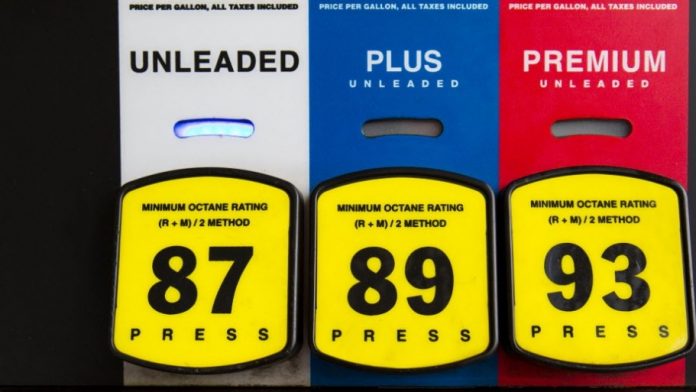
High-octane fuel isn’t for every engine.
Some engines need it – but others do not.
Millions of other engines.
Feeding those engines high-octane fuel is a money-waster. High-octane “premium” fuel (which isn’t necessarily of higher quality, just higher octane; more about this in a moment) generally costs about 30-50 cents or more per gallon. If your car’s engine doesn’t require it, you’re spending several dollars more for every tankful – which can amount to several hundred dollars annually – and several thousand dollars over the 10-15 year lifespan of a new car. 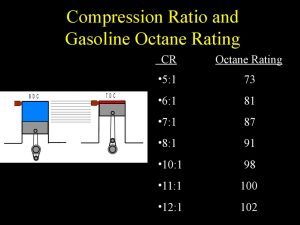
It’s also a power and mileage waster in cars that don’t need it. Many people do not grok this, but an engine not designed to burn high-octane fuel actually runs better (more efficiently) on lower octane fuel.
Because the fuel burns at the right moment. Not too soon – or too late.
It is my sincere desire to provide readers of this site with the best unbiased information available, and a forum where it can be discussed openly, as our Founders intended. But it is not easy nor inexpensive to do so, especially when those who wish to prevent us from making the truth known, attack us without mercy on all fronts on a daily basis. So each time you visit the site, I would ask that you consider the value that you receive and have received from The Burning Platform and the community of which you are a vital part. I can't do it all alone, and I need your help and support to keep it alive. Please consider contributing an amount commensurate to the value that you receive from this site and community, or even by becoming a sustaining supporter through periodic contributions. [Burning Platform LLC - PO Box 1520 Kulpsville, PA 19443] or Paypal
-----------------------------------------------------
To donate via Stripe, click here.
-----------------------------------------------------
Use promo code ILMF2, and save up to 66% on all MyPillow purchases. (The Burning Platform benefits when you use this promo code.)
That’s all octane is, really. A measure of a given fuel’s tendency to combust when subjected to increasing heat and pressure.
Some engines – generally, high-compression engines (this includes turbocharged and supercharged engines) – need a fuel that won’t burn too soon, as the result of high pressure and heat inside the engine’s cylinders – before the spark plug fires.
Which will resist combustion until the piston’s at just the right point in its travel – and not until the ignition system fires the spark plug.
High octane fuel fits that bill.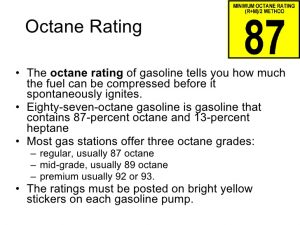
Other engines don’t have high cylinder pressure (comparatively) and so don’t need high-octane gas that is more resistant to spontaneously combusting due to high heat/pressure. They need fuel that burns more readily at lower pressures/heat.
Lower octane gas fits that bill.
This is why there is currently the option to choose the fuel with the right octane rating for your particular car’s engine. High-octane “premium” – generally, unleaded gasoline with an octane rating of 90 or more. And “regular” – generally, unleaded gasoline with an octane rating of 87 or so.
What if that choice were taken away? What if you had to pump the wrong octane fuel into your car’s tank?
Were effectively forced to pay extra for the fuel – as well down the road, in the form of lower mileage?
And very possibly, shorter engine life.
There’s a movement afoot whose object is precisely that – to make high-octane (95 octane) fuel the only fuel generally available. General Motors, in particular, is hard-selling the idea – touting it as a way to increase the power and fuel economy of new cars. Which it would . . . assuming all new car engines are designed to burn high-octane fuel.
But what about the millions of cars still on the road powered by engines not designed for it?
They, apparently, do not matter.
They’ll suffer mileage (and power) reductions. Or rather, their owners will suffer them. People who thought they’d save 30-50 cents per gallon on gas by purchasing a car that doesn’t need high-octane gas will be in for what might as well be a major tax hike on the cost of fueling their cars.
The proposal to make all gas high-octane gas will also help attrite those cars off the road, because in all probability, more ethanol will be added to gas. And those cars are not designed for that, either.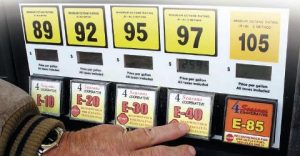
This is not being talked about much in news coverage of the proposal.
It ought to be.
First, a little background:
Almost all unleaded gas sold in the United States is already 10 percent ethanol (“E10”).
This is not a market-driven thing. It is a mandate-imposed thing. In the name of “encouraging” (that is, forcing) people to use more “renewable” fuels, the government created a an artificial market for ethanol – which is certainly “renewable,” but also other not-so-great things, including less energy dense and more expensive than gasoline. It’s also more corrosive and it attracts moisture, not good things for machinery.
But it’s very profitable for the big agribusiness cartels which produce the stuff – because we’re forced to buy it.
Soon, we may be forced to buy more of it.
Because ethanol – in addition to being “renewable” – is also used as an octane enhancer. If the government mandates 95 octane fuel as the new mandatory minimum octane fuel generally available, it will therefore likely mean more ethanol in our gas.
Possibly, E15 – “gas” that is 15 percent ethanol. Maybe more than that.
This won’t be an issue for new car engines designed for the higher octane – and for the higher ethanol content.
But it will be Bad News for any engine not designed for either thing, especially the higher ethanol content.
The reason the ethanol content of mainstream “gas” has so far been limited to 10 percent is because higher ethanol content will damage engines (and fuel storage/delivery systems) not specifically designed to handle it. The stuff accelerates rusting of gas tanks and fuel lines and can damage rubber seals and gaskets not designed to withstand it – the latter potentially leading to fuel leaks and fires.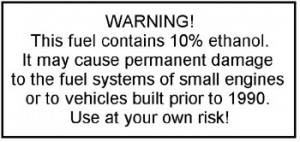
Most cars built since the ’90s can safely use E10; but older cars (and power equipment) sometimes have trouble because of it. Their engines – which don’t have computer-controlled fuel injection systems – can’t adjust for the leaner ethanol/gas mixture and so run hotter – in addition to the problems of fuel system corrosion and seal/gasket degradation.
Very few cars of any vintage – including most new/recent-model cars – are designed to handle “gas” that is more than 10 percent ethanol. Owners of these vehicles are specifically warned not to use “gas” with more than 10 percent ethanol unless specifically told it’s okay. Advised that using more than E10 if not specifically okay’d will void the warranty and leave them holding the bag for any damage done to the engine and related components, such as the fuel tank, fuel pump and fuel lines.
The question arises:
What happens when the government makes it effectively impossible to avoid “gas” that’s less than E15 – 15 percent ethanol?
Well, the agribusiness cartels which make the ethanol will make even more money, of course. We’ll all be buying “premium” gas – whether our cars need it or not.
The car companies cash in, too – since higher concentration ethanol-spiked “gas” will get rid of older (and paid-for) cars sooner and thus “encourage” people to purchase new cars.
The much higher cost of fuel – artificially caused – will also “encourage” people to buy hybrids and electric cars, which use less (and no) gas at all.
We are the marks at this card table.
We’ll get to pay 30-50 cents more per gallon for “premium” our cars don’t need, watch the fuel mileage/performance of our older cars go down – and get nudged into an “efficient” new car (or an expensive hybrid/electric car) sooner.
And – leaving aside the Ethanol Interest – for what?
So that the car industry can build more “efficient” (and more expensive) high-compression engines, in order to appease Uncle’s fuel economy fatwas.
GM’s Dan Nicholson says 95 octane gas (and engines made to burn it) would achieve a 3 percent fuel economy improvement vs. a lower compression engine burning regular.
Wouldn’t it be better – for us – to pay less for cars, and for gas?
Ay, but this isn’t about what’s better for us.
If that weren’t true, there would be no need for mandates, government strong-arming. The market – people’s freely expressed buying preferences – would sort things out naturally.
And that, apparently, is the one thing which can’t be allowed.




Sunoco 260, babe! The only way to fly.
Eric, we get it.
The government exists to force us to buy shit we don’t need with money we don’t have.
Obsessing over and rehashing this universal truth though automotive analogies is getting tiresome.
22…………….”Obsessing over and rehashing this universal truth though automotive analogies is getting tiresome.”
Disagree………….I would venture that most are not aware of the possible pursuit for 95 octane or E15 and the reasons why.
Eric: Keep them coming
Nissan “recommends” premium gas for the Muranos I’ve owned (3) 3.5 liter V-6. I’ve never used it and the cars run fine-no knocks, no untimely repairs. 150,000 miles without a problem.
Don’t waste money on gas that does nothing except bleed your wallet. Turbos probably excepted.
I currently have a newer vehicle with a turbo. Mfr. says 87 octane is just fine and if I want more HP to put the good stuff in. I’ve never put premium fuel in and I’ve never needed the extra power. Do agree that ethanol is a gov’t subsidy for farmers, but that’s a different topic.
Mostly correct, but Eric left a few things out.
The first question we should ask is, “What is octane?”
Octane is a measure of something right? What’s it a measure of?
Octane is a measure of the ‘rate’ at which a given amount of gasoline will combust.
The higher the octane, the slower it combusts.
The engineers that design Otto Cycle engines (four stroke spark ignited gasoline engines) design each one to combust or consume all of its fuel at a given rate.
All octanes contain the same amount of energy.
Higher-octane gasoline does not give an engine more horsepower (HP) because it has more energy. The engine is designed to yield more HP because it can convert that gasoline’s energy more slowly over a longer time of the combustion cycle. In other words, it can squeeze more kinetic energy (mechanical work) out of the same amount of gasoline than it could from a faster burning (lower octane) gas.
Using a higher-octane than is necessary for a given engine design means that the engine does not have enough fuel burn when it needs it and the rest is then wasted.
Eric is correct that using an octane higher than your engine needs will yield LESS MPG and Slower acceleration.
Although you likely will not notice it in your car’s engine, it will also make it harder to start.
That is more apparent in smaller and especially in single cylinder engines like lawn mowers and trimmers, leaf blowers, motors scooters, etc.
The best recommendation is to actually read the owner’s manual (I know, that violates ‘guy stuff’) and use the octane that it recommends – the octane that the engine was actually designed for.
Adding ethanol increases the octane as it has less energy than gasoline. As Eric said, it also attracts moisture. That is why current gasoline does not store well. It gets all gummed up with water when stored for long periods. Gasoline storage life extenders work well it keeping it from getting to an unusable state.
That said, ethanol is added because the corn lobby has bought and paid for our elected representatives and it does in fact reduce the actual mileage we get in our cars. The government mandates ever-increasing dictates on mileage, yet they could increase it across the boards by 3%-5% by simply allowing us to buy gasoline without ethanol in it.
Just some thoughts on gasoline…
You are very right about this. This is the reason why the camshaft lobes on high compression engines are sharp and those on low compression engines broad. The root problem of ethanol as a fuel is that it yields LESS energy than gasoline – and so you need to burn (BUY) more to go the same distance, all other things being equal.
The other end of ethanol is that it completely ruins any small engine unless it is used at least a couple times a week. It also hydrates (holds water) which will separate in the fuel tank, going right to the bottom where the fuel pickup is located. My number one repair at my farm and for my neighbors is draining fuel tanks and lines and carburetor bowls to flush out water each spring – 100% due to ethanol. A few years back I fired up an old JD tractor that had been sitting for 8 years, but the guy had been running aviation gas (no ethanol) – so it fired right up once I got the carburetor bowl cleaned of varnish. You cannot store ethanol mixed fuel for much more than a year, even with additives.
Undoing the crazy EPA regs and the stupid subsidies is the answer. And that is why I am glad to see Pruitt at the EPA – he is undoing a lot of craziness at EPA, and hopefully it will continue. You have to know he is undoing things if you read, and the biggest red flag is seeing congresscritters upset. ANYTHING that upsets them at their feed trough is a good thing for honest Americans.
Recommended fuel for a 2014 Mustang GT Premium with the 5.0 “Coyote” engine with 11.0:1 compression ratio is 87 octane.
http://www.f150hub.com/specs/ford-5.0.html
RS- Eric’s chart on compression ratio versus octane requirements should be viewed as a generality rather than as a hard and fast rule.
Although designing an engine for higher compression will usually allow them to provide one that can yield more HP per displacement, and they often utilize higher octane fuel to provide that extra work it is not always so. There are trade-offs, but computer assisted designs can now provide a lot more flexibility to the end result.
You can have an engine with an 8:1 compression ratio that needs premium fuel or an 11:1 ratio like the Mustang engine you referenced that will run on regular 87 octane.
Best to break down and read that owner’s manual for what it’s designed to run on.
Another important point to keep in mind that although you can run an engine on gasoline that is a higher octane than required without damaging it, the reverse is not so.
Running on too high an octane will result in loss of performance.
Running on octane lower than specified will result in pre-ignition (engine knock) and can be damaging to it.
“Best to break down and read that owner’s manual for what it’s designed to run on.”
I did…and it does specify 87. However, you can always bump it up if you are willing to pay the higher price, and if you spend a couple hundred $$ for a computer “tuner”, it can maximize performance.
RS, higher octane does not equate to increased performance. You’d be wasting $ on higher octane than you need to prevent knocking- pre-igniton.
I guess those tuner makers could be sued for fraud if you are correct:
“Mustang Fuel Octanes and Tuning
You should always order a tune for the highest octane available in your area. The higher the octane the more power and gains you will receive. For example, a stock 2001 5-speed GT might gain 2-3 horsepower on an 87 octane tune but 17 horsepower on 91 and over 20 horsepower on 93 octane. All three of these tunes will have the engines running more efficiently, but the dyno results will be very different. If you are worried you might get stuck because you can’t find the right fuel, order more than one tune. One for 87 Octane to use in emergencies, and then a performance 91 or 93 tune. Now automatics are a slightly different story as they will receive a huge bonus from the transmission being tuned. Even tuning with 87 is worth it, but good horsepower gains will still not be achieved without premium fuel.”
https://www.americanmuscle.com/tuner-differences.html
What is the millisecond difference in the burn time of 87 vs 93 octane when an engine is turning at 2000 rpm?, just wondering, John
Iowa is a major corn producer, and the Iowa Caucuses are the first round of the presidential primaries. Any candidate who opposes ethanol mandates will lose Iowa and his/her campaign momentum.
No no, they are screwing us!!? Say it isn’t so.
The PRODUCTION of ethanol actually consumes more energy than the fuel provides. Mandates are the only thing keeping it viable.
“87 octane gasoline is gasoline that contains 87 percent 0ctane and 13 percent heptane”
Wrong! NO NO NO NO NO
Eric needs to find an engineer who can explain this to him.
Gasoline is a mixture of THOUSANDS of hydrocarbon compounds, not just octane and heptane. Wiki is closer this time:
“a figure indicating the antiknock properties of a fuel, based on a COMPARISON with a mixture of isooctane and heptane.” All gasoline is NOT made of heptane and octane!
And even that ignores all the additives, ethanol, or whatever else may have made it into the BLEND.
jamesthedeplorablewanderer – Nice to see you comment on this as well.
Another question often asked is, “which has more energy, gasoline or diesel fuel?”
The answer is that it depends upon how you measure it.
If you measure it by volume – that’s how we buy it at the pump – then a gallon of diesel fuel has more energy than a gallon of gasoline. About 15% more.
So if diesel fuel costs 15% more than gasoline at the pump, then technically speaking you are paying the same on a dollars per energy basis.
If you measure it by weight though, then an ounce of gasoline has more energy than an ounce of diesel fuel. About 7% more.
Remember that gasoline is a mixture of paraffins, naphthenes, and olefins. It’s lighter than diesel fuel, which is an oil.
That is also why on a gasoline fed two-cycle engine that you need to add oil to the gasoline to lubricate its cylinder during operation, but you do not need to add oil to the diesel fuel of a diesel two-cycle engine. The diesel fuel itself IS an oil.
Diesel fuel is essentially the same as home heating oil.
A few additives are formulated into it to help reduce emissions and a pink dye that shows that the Federal Transportation Tax has been paid on it. When they do those truck stop checks, they dip a clear tube into the fuel tanks. If that fuel doesn’t come out pink, the driver is fined. They make the fine high enough to make it not worth taking the risk.
A diesel engine will run just fine on home heating oil.
That’s also why the price of diesel fuel goes up in late summer time. The refineries are producing some of it as home heating oil (without the pink dye and the additives) for the coming winter. It’s that supply and demand thing in action…
Steve C: I really hate to differ with someone whose comments and posts I have learned so much from, but here in Indiana, the red-tinted fuel is designated for “off-road use only’ , and will get you a $10K hit if found in an over-the-road vehicle. The deal is that off-road use isn’t paying for the highways, since it is supposedly only used in construction equipment, farm tractors and so on, so the red fuel is several cents per gallon cheaper to buy. I wasn’t aware that Texas was different, but I can see an arbitrage possibility here. Best wishes!